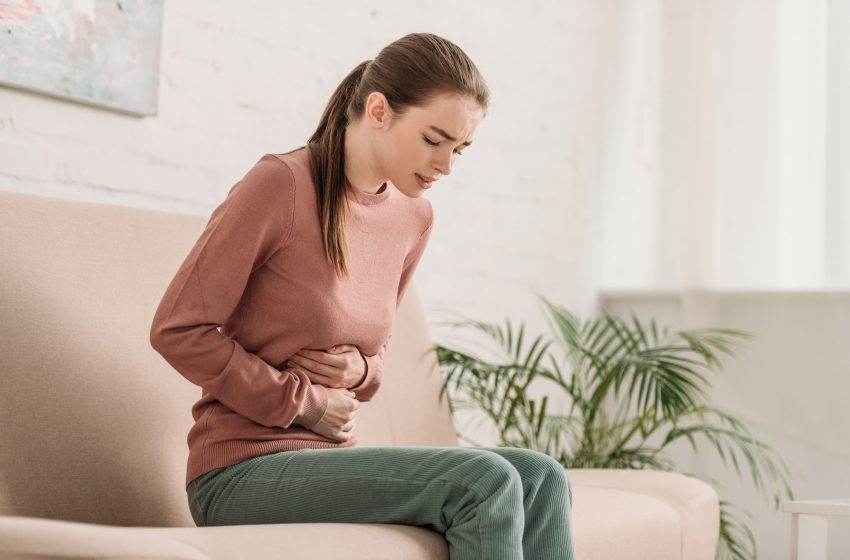
Sharp Stomach Pain That Comes And Goes – The Possible Causes
Sharp stomach pain that comes and goes is a very common problem that can often leave a person doubled over or unable to move for an instant.
It’s a frequent ailment that isn’t generally a symptom of anything dangerous. Even if the pain is intense, timely treatment can alleviate it and prevent significant problems.
Sharp stomach pain is a challenging disease to detect because it is the only symptom. However, additional symptoms and probable circumstances that may contribute to this disease should be considered.
Contents
Causes Of Sharp Stomach Pain That Comes And Goes

Gas and bloating
Both are frequently cyclical, and while gas does not cause long-term harm, the pain can range from moderate to severe. Sharp stomach pain that comes and goes might become gradually worse for many minutes, then improve, then become worse again.
Indigestion, stomach infections, irritable bowel syndrome (IBS), swallowing too much air, and dietary sensitivities such as lactose intolerance are all causes of gas.
In pharmacies, you may find a variety of gas-relieving medicines that can help alleviate the discomfort. Some folks, though, can get relief with heated pads or a light stomach massage.
People who have severe gas pains on a regular basis should contact a doctor, who can assist diagnose any underlying issues and giving advice on how to alleviate symptoms.
Stomach viruses
Viruses in the stomach, such as norovirus, are responsible for severe cramps that come and go. Vomiting typically precedes cramps, providing brief relief.
The symptoms of stomach viruses often persist for a few days. Fever and muscular pains are common side effects of stomach infections.
When you have stomach viruses, it is critical to drink lots of water throughout the period, since stomach viruses normally go away without medical treatment after a few days.
If your symptoms increase, you should get professional help from your local doctor.
Liver and gallbladder problems
Gallbladder problems, such as gallstones, might be indicated by pain on the right side of the stomach that comes and goes.
Gallstones can clog the gallbladder’s ducts, making digestion difficult. This produces pain shortly after eating, especially if the dish is particularly fatty.
Gallstone discomfort often develops a few hours after eating, lasts 4 to 6 hours, and then goes away. Gallstones can pass on their own in some cases.
If they don’t, the bile ducts might get blocked, impairing liver function. It’s crucial to remember that untreated gallstones might cause pancreatic difficulties.
Digestive disorders
Periodic intense discomfort in the stomach can be caused by a variety of digestive diseases. As the body struggles to digest food, the discomfort usually intensifies quickly after a meal.
Inflammatory bowel diseases (IBD), such as Crohn’s or colitis, and celiac disease, are two probable causes of digestive issues. These digestive problems can be excruciatingly uncomfortable, but they are rarely medical emergencies.
Keeping a food journal might assist your doctor in diagnosing the issue and developing a treatment plan. In the short term, pain medications, heating pads, and rest may be beneficial.
Ulcers
An ulcer is a sore in the stomach or gut lining. Long-term use of non-steroidal anti-inflammatory medicines (NSAIDs) like ibuprofen, Helicobacter pylori infection, and non-cancerous stomach growths are all causes of ulcers.
An intense burning feeling in the stomach is common in those who have ulcers. Heartburn or indigestion can result from a burning sensation traveling up the chest and into the mouth or throat.
After a spicy or very acidic meal, symptoms are frequently exacerbated. The discomfort may come and go. Even if a person has no symptoms of having an ulcer, it may be identified, and the ulcer will generally worsen quickly.
Menstrual cramps
Menstrual cramps can be either severe or mild. They might affect just one area of the abdomen in women, or they can spread to the back and legs. Some folks may also experience nausea or diarrhea.
Menstrual cramps can be relieved during or soon before the period, and they normally occur in waves, increasing better and worse as the day progresses.
Menstrual discomfort can be relieved at home with the use of a heating pad, over-the-counter pain medications, and mild stretching.
Menstrual cramps are not hazardous in and of themselves, but severe cramps can make daily tasks difficult. If your period cramps are severe, have worsened, or are interfering with your job or school, see your doctor.
Ovarian cysts
Ovarian cysts are frequent and typically harmless. The majority of the time, people are completely unaware that they have them. Within ovulation, many ovarian cysts develop and then dissolve after a few months.
Ovarian cysts can produce discomfort that comes and goes. An ovarian cyst causes pain in the lower abdomen, generally on one side exclusively. During the menstrual cycle, they may get worse.
If you think you have an ovarian cyst that is giving you pain, you should see your doctor as soon as possible. Imaging tests can help your doctor detect a cyst.
You should be aware of this since a sudden and strong pain in the lower pelvis might indicate ovarian torsion, which occurs when the ovary twists.
Torsion of the ovary is a medical emergency. It can cause serious internal bleeding, ovarian damage, and infection if left untreated.
Ovulation
An egg is released from its follicle in the ovary and enters the fallopian tube during ovulation. This is a common occurrence for many people.
Ovulation discomfort is pain that happens once a month in the midst of the menstrual cycle. If you’re trying to conceive, ovarian discomfort isn’t hazardous and might even be a beneficial fertility indication.

When to see a doctor
Many causes of ongoing stomach pain, such as ovulation pain, do not require treatment. Others, such as food sensitivities, are not medical emergencies.
Many individuals find it difficult to seek medical help, but it is critical to pay attention to discomfort sensations that come and go.
As a result, if you have significant discomfort or pain that develops over time, we urge that you get medical help.
| Speak to a doctor about | Symptoms that may require emergency medical attention include |
| Unexplained stomach pain that gets steadily worse over time | Intense stomach pain during pregnancy
|
| Worsening menstrual cramps or cramps that are regularly severe | Symptoms of premature labor
|
| Worsening digestive symptom | Intense pain in the upper right abdomen
|
| Symptoms of an ulcer or a digestive disorder | Bloody diarrhea |
| Occasional, mild pain in the upper right abdomen | Vomiting and symptoms of dehydration, such as sunken eyes or dry lips |
| Sudden, intense, unexplained abdominal pain |
